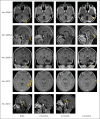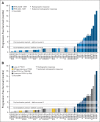Vismodegib Exerts Targeted Efficacy Against Recurrent Sonic Hedgehog-Subgroup Medulloblastoma: Results From Phase II Pediatric Brain Tumor Consortium Studies PBTC-025B and PBTC-032
- PMID: 26169613
- PMCID: PMC4534527
- DOI: 10.1200/JCO.2014.60.1591
Vismodegib Exerts Targeted Efficacy Against Recurrent Sonic Hedgehog-Subgroup Medulloblastoma: Results From Phase II Pediatric Brain Tumor Consortium Studies PBTC-025B and PBTC-032
Abstract
Purpose: Two phase II studies assessed the efficacy of vismodegib, a sonic hedgehog (SHH) pathway inhibitor that binds smoothened (SMO), in pediatric and adult recurrent medulloblastoma (MB).
Patients and methods: Adult patients enrolled onto PBTC-025B and pediatric patients enrolled onto PBTC-032 were treated with vismodegib (150 to 300 mg/d). Protocol-defined response, which had to be sustained for 8 weeks, was confirmed by central neuroimaging review. Molecular tests to identify patterns of response and insensitivity were performed when tissue was available.
Results: A total of 31 patients were enrolled onto PBTC-025B, and 12 were enrolled onto PBTC-032. Three patients in PBTC-025B and one in PBTC-032, all with SHH-subgroup MB (SHH-MB), exhibited protocol-defined responses. Progression-free survival (PFS) was longer in those with SHH-MB than in those with non-SHH-MB, and prolonged disease stabilization occurred in 41% of patient cases of SHH-MB. Among those with SHH-MB, loss of heterozygosity of PTCH1 was associated with prolonged PFS, and diffuse staining of P53 was associated with reduced PFS. Whole-exome sequencing identified mutations in SHH genes downstream from SMO in four of four tissue samples from nonresponders and upstream of SMO in two of four patients with favorable responses.
Conclusion: Vismodegib exhibits activity against adult recurrent SHH-MB but not against recurrent non-SHH-MB. Inadequate accrual of pediatric patients precluded conclusions in this population. Molecular analyses support the hypothesis that SMO inhibitor activity depends on the genomic aberrations within the tumor. Such inhibitors should be advanced in SHH-MB studies; however, molecular and genomic work remains imperative to identify target populations that will truly benefit.
Trial registration: ClinicalTrials.gov NCT00939484 NCT01239316.
© 2015 by American Society of Clinical Oncology.
Conflict of interest statement
Authors' disclosures of potential conflicts of interest are found in the article online at
Figures








Comment in
-
Smoothened Inhibitors in Sonic Hedgehog Subgroup Medulloblastoma.J Clin Oncol. 2015 Aug 20;33(24):2692-4. doi: 10.1200/JCO.2015.62.2225. Epub 2015 Jul 20. J Clin Oncol. 2015. PMID: 26195713 No abstract available.
References
-
- Thompson MC, Fuller C, Hogg TL, et al. Genomics identifies medulloblastoma subgroups that are enriched for specific genetic alterations. J Clin Oncol. 2006;24:1924–1931. - PubMed
-
- Mulhern RK, Palmer SL, Merchant TE, et al. Neurocognitive consequences of risk-adapted therapy for childhood medulloblastoma. J Clin Oncol. 2005;23:5511–5519. - PubMed
Publication types
MeSH terms
Substances
Associated data
Grants and funding
LinkOut - more resources
Full Text Sources
Other Literature Sources
Medical
Research Materials
Miscellaneous

